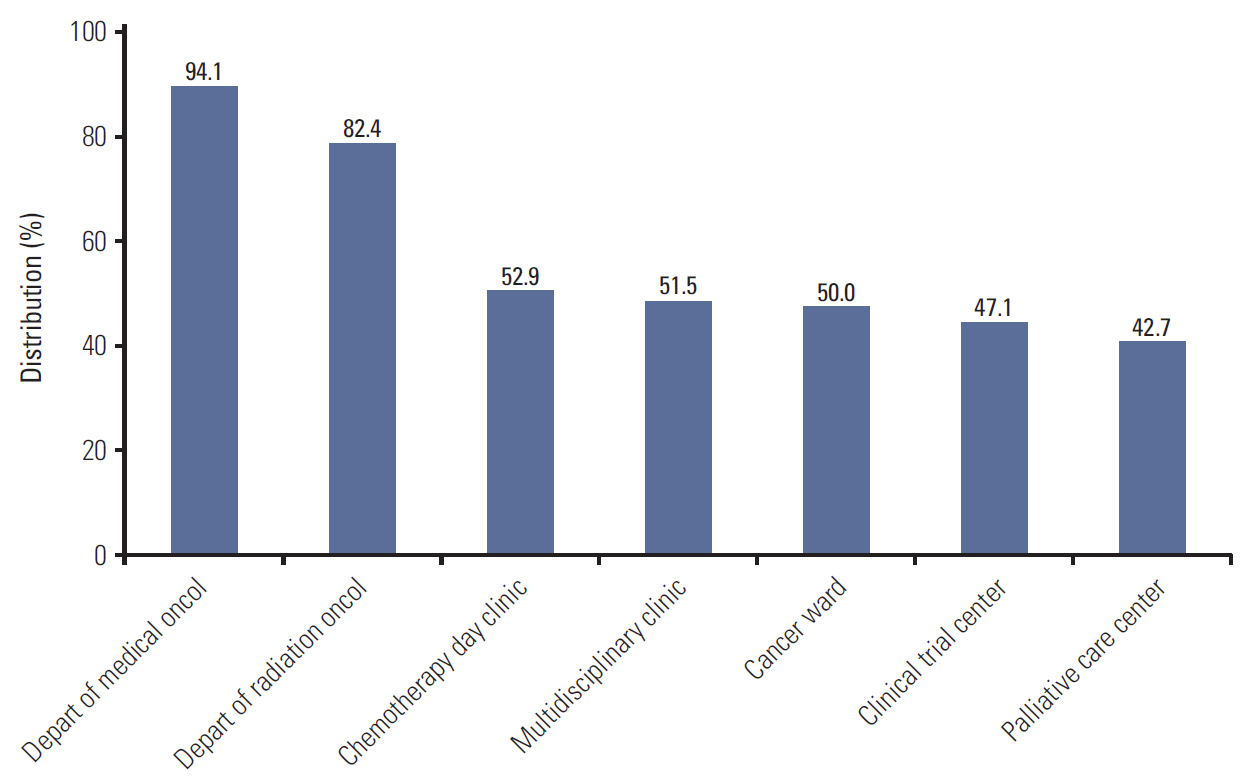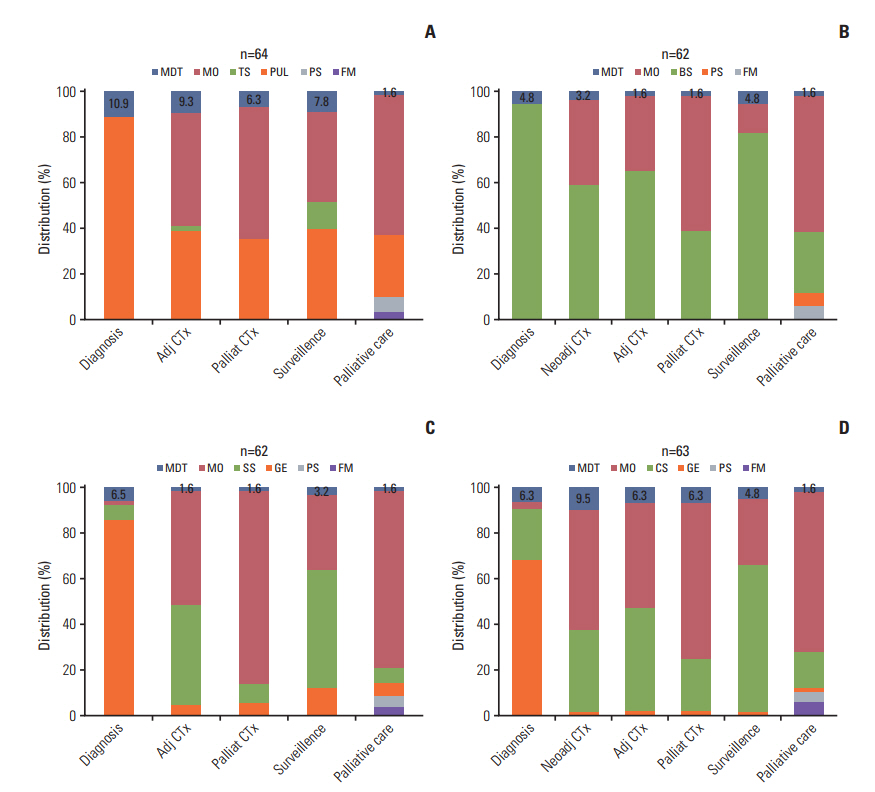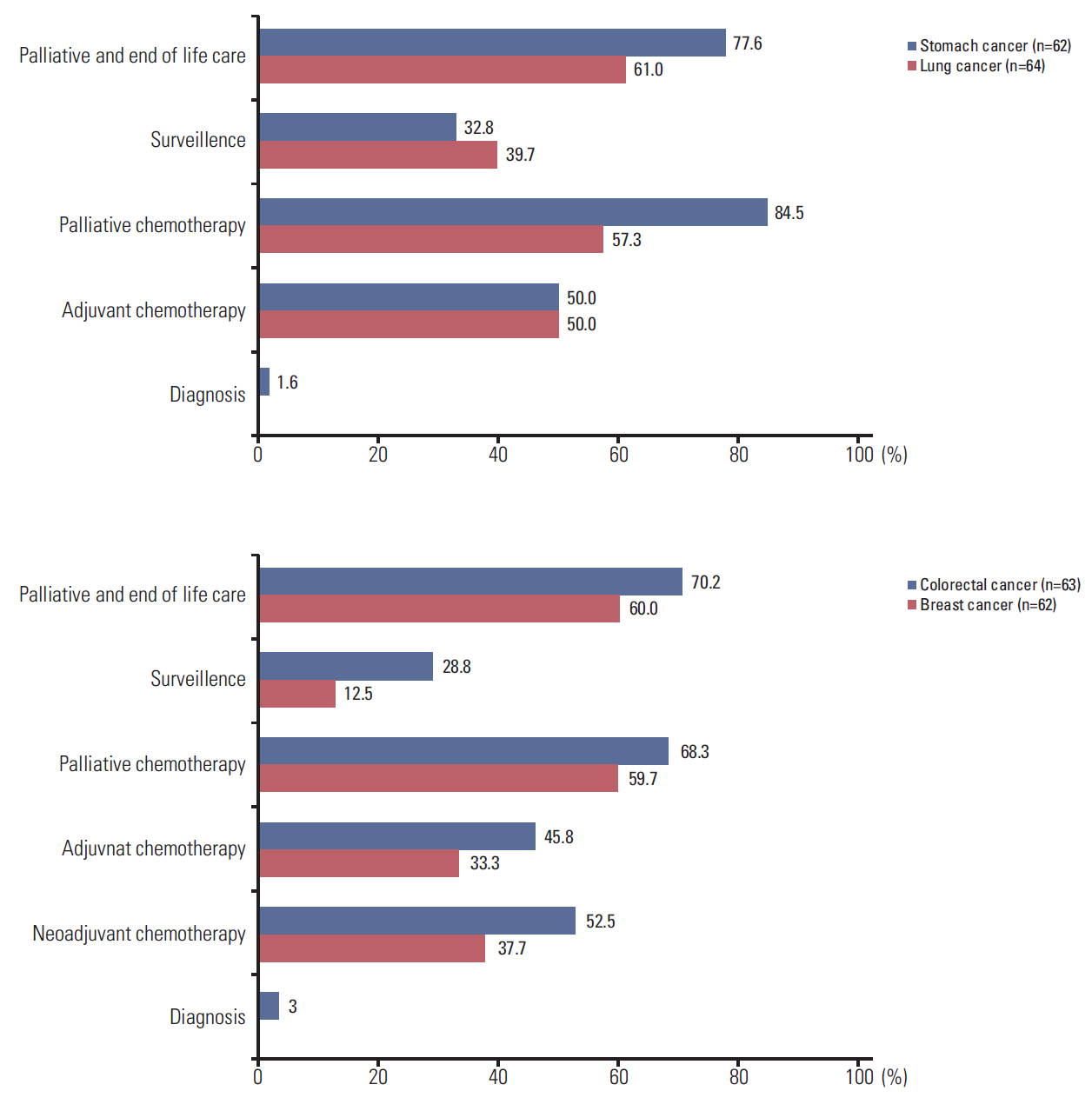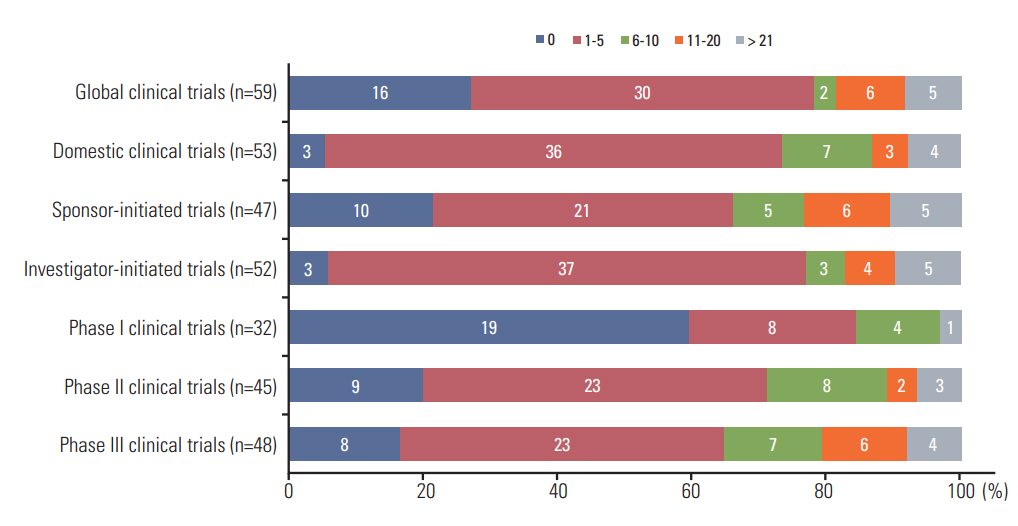Cancer Res Treat.
2017 Jul;49(3):588-594. 10.4143/crt.2016.313.
Survey of Medical Oncology Status in Korea (SOMOS-K): A National Survey of Medical Oncologists in the Korean Association for Clinical Oncology (KACO)
- Affiliations
-
- 1Department of Internal Medicine, Dongguk University Ilsan Hospital, Goyang, Korea.
- 2Department of Internal Medicine, Kangbuk Samsung Hospital, Seoul, Korea.
- 3Department of Internal Medicine, Veterans Health Service Medical Center, Seoul, Korea. seog@bohun.or.kr
- KMID: 2388304
- DOI: http://doi.org/10.4143/crt.2016.313
Abstract
- PURPOSE
This study was conducted to investigate the current role of medical oncologists in cancer care with a focus on increasing the recognition of medical oncology as an independent specialty.
MATERIALS AND METHODS
Questionnaires modified from the Medical Oncology Status in Europe Survey dealing with oncology structure, resources, research, and patterns of care given by medical oncologists were selected. Several modifications were made to the questionnaire after feedback from the insurance and policy committee of the Korean Association for Clinical Oncology (KACO). The online survey was then sent to KACO members.
RESULTS
A total of 214 medical oncologists (45.8% of the total inquiries), including 71 directors of medical oncology institutions, took the survey. Most institutions had various resources, including a medical oncology department (94.1%) and a department of radiation oncology (82.4%). There was an average of four medical oncologists at each institution. Medical oncologists were involved in various treatments from diagnosis to end-of-life care. They were also chemotherapy providers from a wide range of institutions that treated many types of solid cancers. In addition, 86.2% of the institutions conducted research.
CONCLUSION
This is the first national survey in Korea to show that medical oncologists are involved in a wide range of cancer treatments and care. This survey emphasizes the contributions and proper roles of medical oncologists in the evolving health care environment in Korea.
Keyword
MeSH Terms
Figure
Cited by 1 articles
-
Practice Patterns Regarding Multidisciplinary Cancer Management and Suggestions for Further Refinement: Results from a National Survey in Korea
Yun-Gyoo Lee, Sukjoong Oh, Heejin Kimm, Dong-Hoe Koo, Do Yeun Kim, Bong-Seog Kim, Seung-Sei Lee
Cancer Res Treat. 2017;49(4):1164-1169. doi: 10.4143/crt.2016.517.
Reference
-
References
1. Popescu RA, Schafer R, Califano R, Eckert R, Coleman R, Douillard JY, et al. The current and future role of the medical oncologist in the professional care for cancer patients: a position paper by the European Society for Medical Oncology (ESMO). Ann Oncol. 2014; 25:9–15.
Article2. The ASCO POST January 15, 2014. ESMO releases position paper on med-oncs’ role in cancer care [Internet]. Huntington, NY: HSP News Service;2016. [cited 2016 Jul 7]. Available from: http://www.ascopost.com/issues/january-15-2014/esmoreleases-position-paper-on-med-oncs-role-in-cancer-care.aspx.3. The ESCO MOSES Task Force. Medical Oncology Status in European Survey (MOSES) Phase III [Internet]. Viganello-Lugano: European Society for Medical Oncology;2016. [cited 2016 Jul 7]. Available from: https://www.esmo.org/content/download/8359/170041/file/2006-MOSES.pdf.4. The ESCO MOSES Task Force. Medical Oncology Status in European Survey (MOSES) Phase III [Internet]. Viganello-Lugano: European Society for Medical Oncology;2016. [cited 2016 Jul 7]. Available from: https://www.esmo.org/content/download/8358/170037/file/2008-ESMO-MOSES-PhaseIII.pdf.5. The Korean Association of Internal Medicine. Sixth education for resident training staff. Seoul: The Korean Association of Internal Medicine;2015. p. 47–8.6. Shim BY, Park SH, Lee S, Kim JS, Lee KE, Kang YK, et al. Current status and challenges of cancer clinical trials in Korea. Cancer Res Treat. 2016; 48:20–7.
Article7. Centre for Workforce Intelligence (CFWI). Medical Oncology [Internet]. Centre for Workforce Intelligence (CFWI);2016. [cited 2016 Jul 7]. Available from: http://www.cfwi.org.uk/publications/medical-oncology-cfwi-medical-fact-sheet-and-summary-sheet-august-2010/attachment.pdf.8. Erikson C, Salsberg E, Forte G, Bruinooge S, Goldstein M. Future supply and demand for oncologists: challenges to assuring access to oncology services. J Oncol Pract. 2007; 3:79–86.9. Yang W, Williams JH, Hogan PF, Bruinooge SS, Rodriguez GI, Kosty MP, et al. Projected supply of and demand for oncologists and radiation oncologists through 2025: an aging, better-insured population will result in shortage. J Oncol Pract. 2014; 10:39–45.
Article10. European Society for Medical Oncology. Experience sharing by other societies who have performed national workforce surveys. ESMO global cancer task force project of the ESMO emerging countries committee. Viganello-Lugano: European Society for Medical Oncology;2015.11. European Society for Medical Oncology. WHO of a proposal for a workforce survey to answer the question: is the projected workforce able to meet the need to deliver cancer services? ESMO global cancer task force project of the ESMO emerging countries committee. Viganello-Lugano: European Society for Medical Oncology;2015.
- Full Text Links
- Actions
-
Cited
- CITED
-
- Close
- Share
- Similar articles
-
- Current status of brachytherapy in Korea: a national survey of radiation oncologists
- Radiation Oncologists’ Perspectives on Oligometastatic Disease: A Korean Survey Study
- Differential Perspectives by Specialty on Oligometastatic Colorectal Cancer: A Korean Oligometastasis Working Group’s Comparative Survey Study
- Number of Radiation Oncologists in Korea, Adequate or Surplus?
- Discrepant Views of Korean Medical Oncologists and Cancer Patients on Complementary and Alternative Medicine





